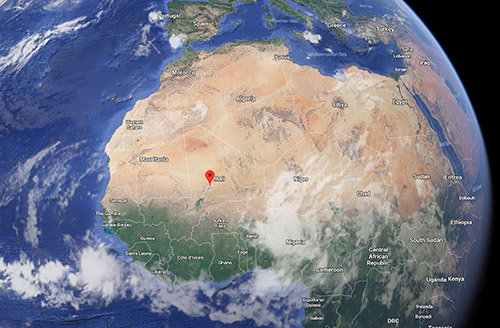 Timbuktu is an ancient city in Mali that sits at the southern edge of the Sahara Desert. GOOGLE MAPS/Special
Timbuktu is an ancient city in Mali that sits at the southern edge of the Sahara Desert. GOOGLE MAPS/SpecialWhat comes to your mind when you hear the word “Timbuktu?” The word may conjure up the thought of an ancient city in Africa that is still a byword for the end of the earth.
My mother used to tell me that if I misbehaved she was going to give me a switching all the way to Timbuktu.
Timbuktu may prompt you to envision camel caravans trekking across the scorching-hot, sand-swept, never-ending Sahara Desert. The city of Timbuktu, capital of one of the eight administrative regions of Mali, is located in the southern edge of the Sahara and nine miles north of the main channel of the Niger River.
Interestingly, there are those who now contend that the geographical center for Christianity has shifted from Jerusalem to Timbuktu. In fact, Brian C. Stiller, global ambassador for the World Evangelical Alliance, has recently written a book entitled From Jerusalem to Timbuktu.
The book of Acts recounts the establishment of the church in Jerusalem, but as the result of the missionary journeys of the Apostle Paul and others, the Gospel spread to Europe and ultimately across the Atlantic Ocean to North America.
Stiller states, “In the past century the church has expanded across Africa, Latin America, and Asia. Thus, Christianity’s geographic center of density is now in the West African country of Mali – in Timbuktu.”
Statistics from the World Council of Churches show that in 1910, 66 percent of all Christians (including Catholics, of course) lived in Europe, but one hundred years later only 26 percent lived there.
In 1910 only two percent of Christians lived in Africa, but today nearly 25 percent of the world’s Christians live in Africa. Furthermore, in 1910, Europe and North America contained 80 percent of all Christians – today it is only 40 percent.
So, we can correctly conclude that Christianity is on the decline in North America and Europe and essentially flourishing in Africa. The number of Christians is growing in Africa in spite of limited funds for spreading the Gospel, a scarcity of resources, and intense persecution.
Mail, in particular, is a place where Christians are kidnapped and held for ransom by Islamic terror groups, where the persecution of Christians has escalated, and where Muslim supremacists are now regrouping and spreading their violence against Christians throughout the region.
According to Open Doors, a website for the persecuted church, “The biggest source of persecution for the just over 500,000 Christians there (Mali) is Islamic oppression. With the increase in Islamic activities, there is also an increase in hostility to Christians, leaving them very little space to live out their lives. No churches can be built and preaching the Gospel is dangerous.”
Christianity has always flourished more in times of adversity than in times of prosperity. C.S. Lewis once stated, “Hardships often prepare ordinary people for an extraordinary destiny.” Tertullian avowed, “The blood of martyrs is the seed of the church.”
The Apostle Paul suffered for the cause of Christ, but knowing that God’s Word is powerful, he never ceased to proclaim the unsearchable riches of Christ. In fact, he said, ”Wherein I suffer trouble, as an evildoer, even unto bonds; but the word of God is not bound” (Philippians 1:29).
Paul also believed that suffering is a part of God’s plan to strengthen the church. He said, “Yea, and all that will live godly in Christ Jesus shall suffer persecution” (I Timothy 3:12).
Additionally, Paul believed that every situation should be seized as an opportunity to share the Gospel. He proclaimed, “And whatever ye do in word or deed, do all in the name of the Lord Jesus, giving thanks to God the Father through him” (Colossians 3:17).
However, in America today the church, for the most part, is enjoying significant material wealth and significant religious freedom in the midst of abject moral and spiritual decline.
So, how do we reverse the trending decline in our churches? There are two possibilities:
First, call the church to a season of intense prayer and fasting. Ask God to give the pastor a vision from above for the future of the church. Resolve to serve the community by ministering to schools, government employees, and neighborhoods as much as time and resources allow.
Determine to improve the quality of worship, Bible study, music ministry, and discipleship. Train the members to become witnesses for Christ at all times or at least emphasize the power of inviting people to come to the church for worship and other activities and set aside a time for evangelizing the community. Be willing to risk something for the cause of Christ; stretch the faith of the congregation.
Second, since the church always seems to prosper more in times of adversity, you could pray for adversity – the kind of adversity that the Christians of Timbuktu, Mali are experiencing.
The two options mentioned above require extremely hard work and a renewed zeal for the things of God or the possibility of intense persecution in the midst of an unwavering allegiance to God. Pick the one option you prefer or drift into the realm of the lukewarm that characterized the church at Laodicea.